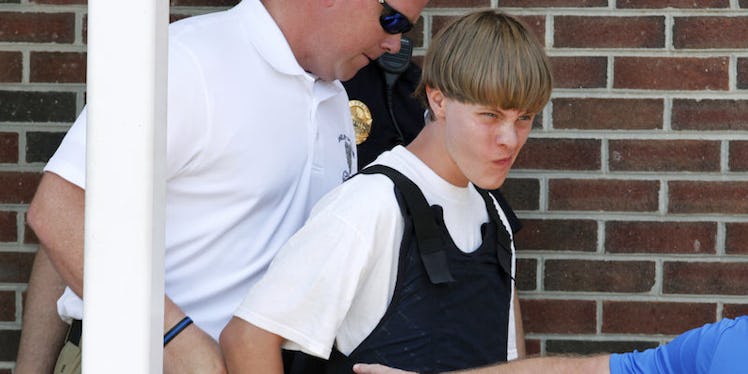
The Charleston Shooter Will Face The Death Penalty, But Should He?
Last June, nine people were tragically killed in a racially motivated shooting at Emanuel AME Church in Charleston, South Carolina.
On Tuesday, the US Justice Department announced it will seek the death penalty against Dylann S. Roof, the accused shooter.
In a statement regarding Roof's case, Attorney General Loretta Lynch said,
Following the department's rigorous review process to thoroughly consider all relevant factual and legal issues, I have determined that the Justice Department will seek the death penalty. The nature of the alleged crime and the resulting harm compelled this decision.
Roof, who is 22 years old and white, is charged with 33 federal offenses, including hate crime charges, weapons charges and obstructing the practice of religion.
Last September, the state of South Carolina also said it would seek the death penalty against Roof, as he faces murder charges in a state court. The state trial is set to begin in January, according to the New York Times, but a date for the federal trial has not yet been decided on.
The horrific shooting that occurred on June 17, 2015 during a Bible study in a historically black congregation, left the nation shocked due to both the nature of the massacre as well as the racist motivations surrounding it.
Nine people who were peacefully observing their religion at a church with a proud tradition of fighting for civil rights were viciously stolen from this world.
What happened was sickening, and stands as yet another reminder the US has not escaped the legacies of slavery and Jim Crow.
Even still, it's fair to question whether the death penalty is the correct response.
The United States is one of the world's top five executioners, only surpassed by China, Iran, Pakistan and Saudi Arabia in terms of the countries in which the most executions took place in 2015.
Meanwhile, more than two-thirds of the world's countries have abolished the death penalty.
By retaining the death penalty, the US remains in the same company as some of the worst human rights abusers in the world.
Research also shows there is no strong evidence the death penalty effectively deters crime.
Not to mention, a 2015 study from Seattle University found that it costs tax payers, on average, around $1.15 million more per case when prosecutors pursue the death penalty versus when they don't.
We also can't ignore the fact the flawed nature of the US justice system has led to the execution of innocent people, and even individuals with mental disabilities. Correspondingly, capital punishment also disproportionately impacts minorities: 55 percent of those presently awaiting execution are black.
For all of these reasons and more, the death penalty is arguably inhumane, ineffective and far too expensive.
Some might acknowledge all of this, but still contend it's the only way to bring peace to the families.
But perhaps they should consider the fact some of the families of the victims of the Charleston shooting publicly forgave Dylann Roof just two days after the shooting. Sometimes, even those hurt the most by such heinous crimes don't necessarily see a benefit to ending the lives of the perpetrators.
Bill and Denise Richards, for example, the parents of the youngest victim of the Boston Marathon bombings, 8-year-old Martin Richards, wrote an open letter to the Justice Department last April stating they didn't want the government to pursue the death penalty against Dzhokhar Tsarnaev.
In their words,
We understand all too well the heinousness and brutality of the crimes committed. We were there. We lived it. The defendant murdered our 8-year-old son, maimed our 7-year-old daughter, and stole part of our soul. We know that the government has its reasons for seeking the death penalty, but the continued pursuit of that punishment could bring years of appeals and prolong reliving the most painful day of our lives. …As long as the defendant is in the spotlight, we have no choice but to live a story told on his terms, not ours.
In May 2015, not long after the Richards wrote the letter, Tsarnaev was sentenced to death.
The use of the death penalty has declined across America in recent years, which many would say is a good thing. But perhaps it's time to end the practice altogether.
Sentencing someone to rot in a cell for the rest of his or her life is arguably a far worse and just punishment.